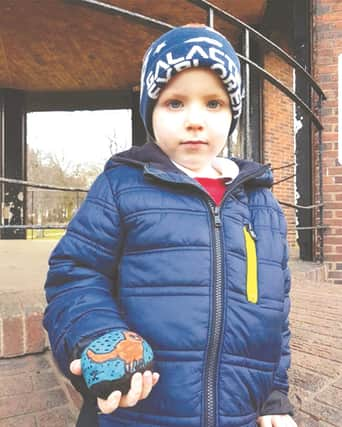Sick Shay Turner (5) given "ten-fold overdose" of insulin after "serious error" by Rotherham Hospital doctor


The second day of Shay’s inquest at Doncaster Coroner's Court heard yesterday how junior doctor Joana Capela prescribed an “incorrect dose” of insulin to the Rawmarsh youngster in the hospital’s accident and emergency department.
Shay (pictured) was taken to the hospital after becoming unwell on March 30 last year.
Advertisement
Hide AdAdvertisement
Hide AdDr Capela described the department as “busy” that day and said they were a staff member down compared to a normal day due to it being the Good Friday bank holiday.
Dr Kiran Kumar was the paediatric registrar on the ward and sent an emergency bleep call asking for Dr Capela’s assistance, the junior doctor said.
She said he had told her Shay had a working diagnosis of diabetic ketoacidosis, a serious complication of diabetes referred to as DKA, and had asked her to prescribe Shay an antibiotic and a saline fluid, which is given to treat shock.
Dr Capela said she had expected a handover to be made regarding Shay’s background and current symptoms, but added “it didn’t happen”.
Advertisement
Hide AdAdvertisement
Hide AdShe said she felt under pressure after being asked by Dr Kumar to carry out a number of tasks, including ordering blood samples and X-rays, and making calculations on the amount of antibiotics and insulin to prescribe.
“We are told in the medical profession to not be interrupted when doing the calcuations, but I was interrupted by a fast bleep,” Dr Capela added.
“I was trying to do bloods and calculations at the same time and didn’t want anyone to wait due to the urgency of Shay’s condition.”
Speaking at the inquest on Monday, Dr Kumar, who assessed Shay, said he had considered both diabetes and sepsis, but favoured the diagnosis of DKA after he received a history of Shay’s symptoms from his mum Laura.
Advertisement
Hide AdAdvertisement
Hide AdHe said Mrs Turner had said Shay had been “drinking more and urinating more” over the recent days before going to A&E, which led the doctor to suspect complications odf diabetes.
Mrs Turner denied in her witness statement that she had said this.
“Shay’s symptoms made me think the primary diagnosis was diabetes and I have seen many children with it,” said Dr Kumar.
“Looking back at the history made me think it was the most likely issue.”
Advertisement
Hide AdAdvertisement
Hide AdHowever, Dr Kumar told the inquest that if it had not been for the previous history, he would have thought about sepsis over diabetes.
Dr Capela said she had ended up prescribing Shay one unit per kilo of insulin per hour because she thought that was what Dr Kumar had said to her, but she could not recall the exact words exchanged.
She went on to check the calculations with the official guidelines, but admitted she “can’t have looked properly” as she prescribed the incorrect dose.
“The prescripton errors shows a lack of focus on my part, with the urgency of the situation contributing to that,” said Dr Capela.
Advertisement
Hide AdAdvertisement
Hide Ad“There was a lot going on, I had a lot on my mind and I was interrupted.”
Paediatric consultant Dr James Donnelly was called to assist with Shay by Dr Kumar and said he now accepted that Shay’s diabetes-related diagnosis had been incorrect.
He said he had taken over from Dr Kumar on the day and was informed of the working diagnosis of DKA.
Shay had been breathing fast but his chest sounded clear, Dr Donnelly said.
Advertisement
Hide AdAdvertisement
Hide AdHe also noted Shay’s heart rate was elevated but said he could see some signs of improvement.
Dr Donnelly said he had considered sepsis was a possibility but had worked with the diagnosis presented to him.
The consultant said it was only after Shay was moved from the emergency department to the High Dependency Unit that he had noticed Shay was being given too much insulin.
“I noticed a rate of 18 mils an hour of insulin solution and thought it was unusual,” he said.
Advertisement
Hide AdAdvertisement
Hide Ad“I spoke to the staff nurse looking after Shay at the time and at this point I realised he was receiving a ten-fold overdose.”
It was then decided to keep Shay on a low dose of insulin, rather than stopping it altogether.
Dr Donnelly said he had told Shay’s parents straight away there had been a “serious medication error”.
Staff nurse Leah Nixon, who was helping with Shay’s care on the High Dependency Ward, and said she had had a “gut feeling” Shay may have had sepsis rather than diabetes and had questioned doctors on two occasions if the treatment being given to him was right.
Advertisement
Hide AdAdvertisement
Hide Ad“When children are unwell they present a stress response and my gut feeling was he was septic rather than diabetic,” Ms Nixon added.
“But I was told by paediatrics that his history fitted with the symptoms of diabetes.”
Dr Donnelly said Shay’s condition had continued to deteriorate and he had suspected Shay’s brain was filling with fluid and had begun to question the diabetes-related diagnosis and called on the Embrace team at Sheffield Children's Hospital for further help.
Speaking at the inquest, Dr Donnelly said that he could not say if things would have turned out differently if a diagnosis of sepsis had been considered first and he was still unsure whether not doing so had contributed to Shay’s death.
Advertisement
Hide AdAdvertisement
Hide AdHe said he also couldn’t say where the shock which caused Shay’s condition to deterioate so rapidly had originated from.
Shay was later moved to Sheffield Children's Hospital but died on April 2.
A pathologist's report concluded the high insulin dose did not cause the catastrophic brain injury that led to his death.
The inquest continues.